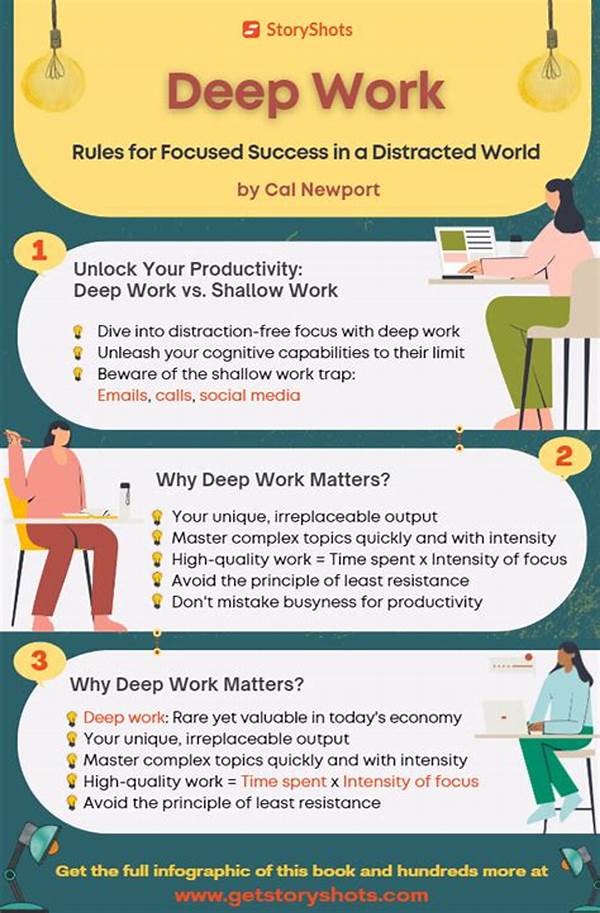In today’s fast-paced world, distractions are just a notification away, and the ability to focus deeply on a task is becoming a rare skill. The concept of “deep work” has emerged as a solution for those yearning to produce high-quality work in less time. But what exactly does “deep work” mean? Introduced by Cal Newport in his groundbreaking book, “Deep Work: Rules for Focused Success in a Distracted World,” deep work is defined as professional activities performed in a state of distraction-free concentration that pushes cognitive capabilities to their limit. The deep work meaning goes beyond just hard work; it encompasses the ability to work on complex tasks without interruptions, ultimately resulting in improved performance and a greater sense of accomplishment.
Read More : Deep Work Bahasa Indonesia Pdf
Why is this important? Because we are living in the age of information overload where knowledge workers are more likely to zone out or multitask rather than hone in on a single challenging task. Research indicates that being efficient is not just about working harder; it requires smarter work strategies, and deep work offers just that. Not only does it allow individuals to master hard skills more quickly, but it also enables them to produce tangible, high-quality results in less time. Imagine being the exclusive member of a club that harnesses this profound power to optimally manage your time and mental energies. This is what deep work promises—an exclusive, priceless ticket to success.
Benefits of Deep Work
The deep work meaning signifies the kind of focus that lets you solve complex problems and learn hard skills with more precision and creativity. By practicing deep work regularly, you can accomplish tasks that demand significant cognitive effort, such as coding, writing, or strategic planning, without feeling exhausted. In a world saturated with distractions, adopting deep work as a norm enables you to produce top-notch results and maintain high productivity levels over extended periods.
—
In a society constantly vying for our attention, deep work emerges as a method to reclaim our focus and supercharge our productivity. But why exactly does this technique stand out from other productivity methods? The deep work meaning, when broken down, equips you with the mental fortitude to concentrate on tasks that truly matter, essentially transforming how you approach work and life in general. Here, we delve into why deep work holds such transformational value.
The Science Behind Deep Work
The deep work meaning has its roots deeply embedded in cognitive psychology. Research suggests that our brains operate in two modes: the “focused” mode and the “diffuse” mode. When engaging in deep work, our brains exclusively toggle into the focused mode, allowing for intense bursts of concentration on a single task. This is in contrast to multitasking, where our brains are constantly switching contexts, leading to cognitive drain. For instance, according to studies quoted by the American Psychological Association, frequent task switching can lower productivity by as much as 40%. Herein lies the power of deep work—creating an environment where the brain can focus without interruptions boosts cognitive efficiency and sharpens problem-solving skills.
Why We Need Deep Work
In a workplace setting, the demand for high-level cognitive tasks has increased exponentially. Gone are the days where simple repetitive work was the norm. Exceptional problem-solving, inventive thinking, and quick learning are facets expected from knowledge workers today. The deep work meaning aligns seamlessly with these demands. It provides a strategic advantage by enabling workers to immerse themselves in challenging tasks and unlock insights that wouldn’t be possible in a distracted state.
Moreover, the benefits of implementing deep work in your daily routine extend beyond just increased productivity. It promotes a state of flow—a feeling of being “in the zone,” where your productivity peaks, time seems to fly, and tasks become more enjoyable. As noted author Mihaly Csikszentmihalyi describes in his research, flow is intrinsically rewarding and can lead to a more fulfilling work life.
Applying Deep Work in Your Life
If you’re intrigued by the deep work meaning and ready to transform how you work, start by setting aside specific blocks of time each day for uninterrupted work. Create an environment void of browsers, notifications, or any other cognitive intrusions. Committing to a routine that incorporates deep work not only boosts output but also enhances your skills, making you a more valuable asset in your professional endeavors.
—
—
What lies at the core of the deep work philosophy? It’s the notion that in a world of diminishing attention spans, the capacity for deep work training entices with promises of unparalleled efficiency. This not only pertains to your working life but spills over into personal pursuits as well. Consider the deep work meaning as your personal trainer: challenging and rewarding, ultimately taking you to mental heights previously unexplored.
Implementing deep work strategies becomes especially crucial when we identify the temptation of multitasking that our current environments foster. Regular interruptions, be it a buzzing smartphone or a tempting internet rabbit hole, often lead to fragmented attention, impacting mental resilience. By consciously opting for deep work, you actively combat attention-fragmentation, embracing a way of work where your cognitive efforts align perfectly with your objectives.
To successfully integrate the deep work meaning into your life, set realistic targets aligned with both professional and personal growth objectives. For example, reserve morning hours for in-depth tasks—the time when your mind is fresh and less cluttered. Use afternoons for more routine tasks or meetings, aligning your energy with work that requires less focused attention.
The ultimate takeaway is clear: prioritizing and practicing deep work not only saves time but opens doors to potential that’s both stimulating and expansive. Whether it’s innovating new product lines or mastering a language, deep work gives your cognitive abilities exactly what they crave—the challenge to reach new heights.
Incorporating Deep Work Meaning into Daily Life
In contemplating the deep work meaning, consider what it could do for your professional landscape. The art of deep work isn’t just about burying oneself in labor-intensive work but about selectively zoning into introspective tasks that yield remarkable rewards. Imagine leveraging this technique to not only become a distinct problem-solver but to thrive in the competition-intense professional environment.
—
The deep work meaning encompasses a holistic approach to concentration and brain optimization, serving as a scaffold to both personal and professional realms. Embrace it, and discover not just improved work output but a more enriched, satisfying life.
Embarking on a Journey of Deep Work
To successfully dive into deep work, it is essential to carve out an intentional, distraction-free workspace. Whether this involves setting boundaries in your office or creating a focused corner in your home, environment plays a pivotal role. Take proactive steps like setting your phone to airplane mode or delegating less important tasks to designated times.
Embracing deep work is a commitment to both long-term productivity and personal enrichment. Once the benefits start manifesting, you will notice an evident transformation: tasks that once seemed daunting become manageable, and the satisfaction derived from deeply focused work transcends into multiple facets of life. Take this journey not only to redefine your sense of productivity but to unlock a new realm of professional satisfaction.


